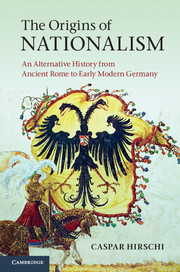Book contents
- Frontmatter
- Contents
- Figures
- Preface
- 1 Introduction
- 2 The modernist paradigm: strengths and weaknesses
- 3 Foundations of a new nationalism theory
- 4 Killing and dying for love: the common fatherland
- 5 Competing for honour: the making of nations in late medieval Europe
- 6 The nationalist transformation of borders and languages
- 7 Humanist nationalism
- 8 A German Emperor for the German people
- 9 Nation and denomination
- 10 Conclusion
- Bibliography of works cited
- Index
9 - Nation and denomination
Published online by Cambridge University Press: 05 June 2012
- Frontmatter
- Contents
- Figures
- Preface
- 1 Introduction
- 2 The modernist paradigm: strengths and weaknesses
- 3 Foundations of a new nationalism theory
- 4 Killing and dying for love: the common fatherland
- 5 Competing for honour: the making of nations in late medieval Europe
- 6 The nationalist transformation of borders and languages
- 7 Humanist nationalism
- 8 A German Emperor for the German people
- 9 Nation and denomination
- 10 Conclusion
- Bibliography of works cited
- Index
Summary
It is over with Germans … Germany has been what it has been. The vast, utmost wickedness is everyday getting riper for slaughter … I want to prophesy to Germany – not from the stars, but from theology and the Word of God – God’s wrath, since it is impossible that Germany can go unpunished. It must suffer a great rout.
Martin Luther, Table Talks, quote from 1539Mother Rome: O Germany, I tell you, if you keep and listen to Luther and his godless bunch for longer, nobody will endanger you as much as yourself. I, however, will then, out of motherly goodness, not be ready to ignore your misery, when seeing (God may forestall it!) that your members kill, burn and ravage each other in strife, that they wreck each other’s bodies, goods and honours.
Johannes Cochlaeus, A Pious Exhortation of Rome to Germany, 1525In 1517, when a little-known Augustinian monk with a doctorate in theology and a solid classical education entered the stage of church reform, the majority of German humanists immediately greeted him as one of their own. Quite a few, and probably the noisiest ones, even put their nationalist hopes on his broad shoulders. They expected him to restore the honour and freedom of the German nation by ending the alleged exploitation of Germany by the Roman Church and by purifying the German clergy from moral depravity and material excess. In Ulrich von Hutten’s widespread dialogues, Vadiscus or the Roman Trinity (Vadiscus sive trias Romana) and The Onlookers (Inspicientes), both published in April 1520, Martin Luther’s cause appeared as a nationalist enterprise for the liberation of Germany.
The initial support by humanists for the Wittenberg professor proved crucial in turning a local protest into a national reform movement. However, no humanist had asked for a theological revolution. When this was later delivered from the pen of the same monk, many of Luther’s earliest proponents reacted with bewilderment and their love affair with the Reformation came to an abrupt end (see Figure 12). Most exponents of the older generation of German humanists, who had started their literary career under Maximilian’s reign, either quietly retreated from the new theological battlefield or marched with loud protests into the Catholic camp. Eventually, Luther’s most tenacious opponents within Germany came from similar circles as his initial supporters. Catholic polemicists such as Johannes Cochlaeus (1479–1552), Johannes Eck (1486–1543) and Thomas Murner (1475–1537) were all humanist theologians.
- Type
- Chapter
- Information
- The Origins of NationalismAn Alternative History from Ancient Rome to Early Modern Germany, pp. 196 - 211Publisher: Cambridge University PressPrint publication year: 2011



